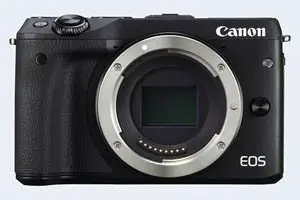Canon M100 vs M3
The Canon EOS M100 and the Canon EOS M3 are two digital cameras that were officially introduced, respectively, in August 2017 and February 2015. Both the M100 and the M3 are mirrorless interchangeable lens cameras that are equipped with an APS-C sensor. Both cameras offer a resolution of 24 megapixels.
Below is an overview of the main specs of the two cameras as a starting point for the comparison.

Check M100 offers at
ebay.com

Check M3 offers at
ebay.com
Going beyond this snapshot of core features and characteristics, what are the differences between the Canon EOS M100 and the Canon EOS M3? Which one should you buy? Read on to find out how these two cameras compare with respect to their body size, their imaging sensors, their shooting features, their input-output connections, and their reception by expert reviewers.
Body comparison
The physical size and weight of the Canon M100 and the Canon M3 are illustrated in the side-by-side display below. The two cameras are presented according to their relative size. Three successive views from the front, the top, and the rear are shown. All width, height and depth measures are rounded to the nearest millimeter.
Both cameras are available in two different colors (black, white).
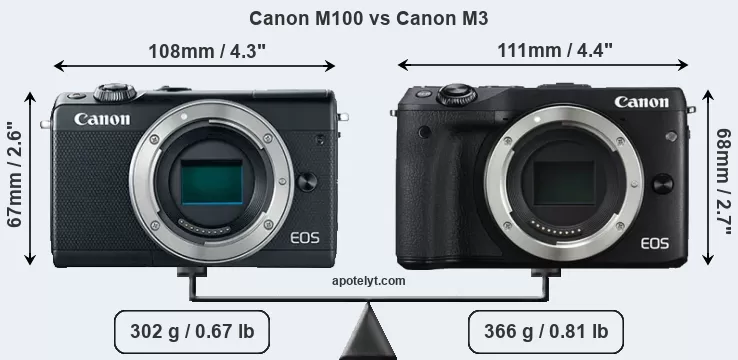

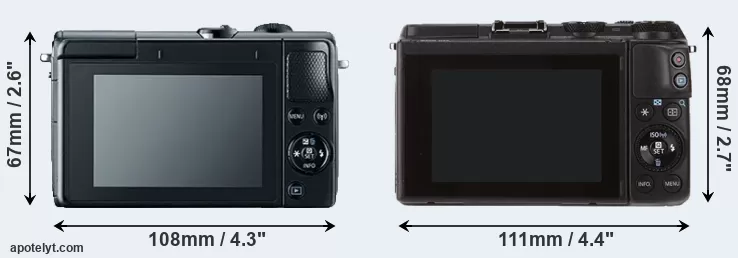
If the front view area (width x height) of the cameras is taken as an aggregate measure of their size, the Canon M3 is somewhat larger (4 percent) than the Canon M100. Moreover, the M3 is markedly heavier (21 percent) than the M100. In this context, it is worth noting that neither the M100 nor the M3 are weather-sealed.
The above size and weight comparisons are to some extent incomplete since they do not consider the interchangeable lenses that both of these cameras require. Hence, you might want to study and compare the specifications of available lenses in order to get the full picture of the size and weight of the two camera systems.
Concerning battery life, the M100 gets 295 shots out of its Canon LP-E12 battery, while the M3 can take 250 images on a single charge of its Canon LP-E17 power pack.
The table below summarizes the key physical specs of the two cameras alongside a broader set of comparators. In case you want to display and compare another camera duo, you can use the CAM-parator app to select your camera combination among a large number of options.

| Camera Model |
Camera Width |
Camera Height |
Camera Depth |
Camera Weight |
Battery Life |
Weather Sealing |
Camera Launch |
Launch Price (USD) |
Street Price |
||
|---|---|---|---|---|---|---|---|---|---|---|---|
| 1. | Canon M100 | 108 mm | 67 mm | 35 mm | 302 g | 295 | n | Aug 2017 | 499 | ebay.com | |
| 2. | Canon M3 | 111 mm | 68 mm | 44 mm | 366 g | 250 | n | Feb 2015 | 679 | ebay.com | |
| 3. | Canon G9 X Mark II | 98 mm | 58 mm | 31 mm | 206 g | 235 | n | Jan 2017 | 529 | ebay.com | |
| 4. | Canon M | 109 mm | 66 mm | 32 mm | 298 g | 230 | n | Jul 2012 | 599 | ebay.com | |
| 5. | Canon M5 | 116 mm | 89 mm | 61 mm | 427 g | 295 | n | Sep 2016 | 979 | ebay.com | |
| 6. | Canon M6 | 112 mm | 68 mm | 45 mm | 390 g | 295 | n | Feb 2017 | 779 | ebay.com | |
| 7. | Canon M10 | 108 mm | 67 mm | 35 mm | 301 g | 255 | n | Oct 2015 | 499 | ebay.com | |
| 8. | Canon M50 | 116 mm | 88 mm | 59 mm | 390 g | 235 | n | Feb 2018 | 779 | ebay.com | |
| 9. | Canon M200 | 108 mm | 67 mm | 35 mm | 299 g | 315 | n | Sep 2019 | 549 | ebay.com | |
| 10. | Canon SL2 | 122 mm | 93 mm | 70 mm | 453 g | 650 | n | Jun 2017 | 549 | ebay.com | |
| 11. | Canon T6i | 132 mm | 101 mm | 78 mm | 555 g | 440 | n | Feb 2015 | 749 | ebay.com | |
| 12. | Canon T6s | 132 mm | 101 mm | 78 mm | 565 g | 440 | n | Feb 2015 | 649 | ebay.com | |
| 13. | Canon T7 | 129 mm | 101 mm | 78 mm | 475 g | 500 | n | Feb 2018 | 449 | amazon.com | |
| Note: Measurements and pricing do not include easily detachable parts, such as add-on or interchangeable lenses or optional viewfinders. | |||||||||||
Any camera decision will naturally be influenced heavily by the price. The manufacturer’s suggested retail prices give an idea on the placement of the camera in the maker’s lineup and the broader market. The M100 was launched at a markedly lower price (by 27 percent) than the M3, which puts it into a different market segment. Usually, retail prices stay at first close to the launch price, but after several months, discounts become available. Later in the product cycle and, in particular, when the replacement model is about to appear, further discounting and stock clearance sales often push the camera price considerably down.
Sensor comparison
The size of the imaging sensor is a crucial determinant of image quality. A large sensor will tend to have larger individual pixels that provide better low-light sensitivity, wider dynamic range, and richer color-depth than smaller pixel-units in a sensor of the same technological generation. Furthermore, a large sensor camera will give the photographer more possibilities to use shallow depth-of-field in order to isolate a subject from the background. On the downside, larger sensors tend to be more expensive and lead to bigger and heavier cameras and lenses.
Both cameras under consideration feature an APS-C sensor and have a format factor (sometimes also referred to as "crop factor") of 1.6. Within the spectrum of camera sensors, this places the review cameras among the medium-sized sensor cameras that aim to strike a balance between image quality and portability. Both cameras have a native aspect ratio (sensor width to sensor height) of 3:2.
In terms of chip-set technology, the M100 uses a more advanced image processing engine (DIGIC 7) than the M3 (DIGIC 6), with benefits for noise reduction, color accuracy, and processing speed.
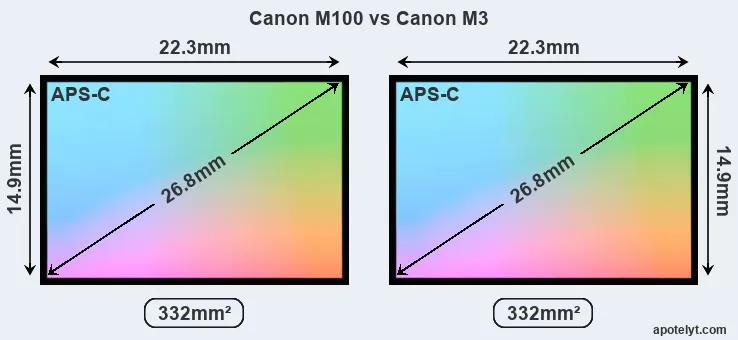
The two cameras under review do not only share the same sensor size, but also offer an identical resolution of 24 megapixels. This similarity in sensor specs implies that both the M100 and the M3 have the same pixel density, as well as the same pixel size. It should, however, be noted that the M100 is much more recent (by 2 years and 6 months) than the M3, and its sensor will have benefitted from technological advances during this time.
The Canon EOS M100 has a native sensitivity range from ISO 100 to ISO 25600. The corresponding ISO settings for the Canon EOS M3 are ISO 100 to ISO 12800, with the possibility to increase the ISO range to 100-25600.
Technology-wise, both cameras are equipped with CMOS (Complementary Metal–Oxide–Semiconductor) sensors. Both cameras use a Bayer filter for capturing RGB colors on a square grid of photosensors. This arrangement is found in most digital cameras.
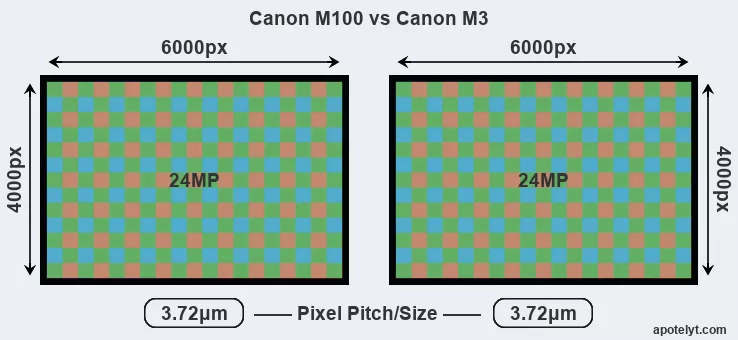
For many cameras, data on sensor performance has been reported by DXO Mark. This service determines an overall sensor rating, as well as sub-scores for low-light sensitivity ("DXO Sports"), dynamic range ("DXO Landscape"), and color depth ("DXO Portrait"). Of the two cameras under review, the M100 has a notably higher overall DXO score than the M3 (overall score 6 points higher), which gives it an advantage in terms of imaging quality. This advantage is based on 0.7 bits higher color depth, 1.1 EV in additional dynamic range, and 0.1 stops in additional low light sensitivity. The table below summarizes the physical sensor characteristics and sensor quality findings and compares them across a set of similar cameras.

| Camera Model |
Sensor Class |
Resolution (MP) |
Horiz. Pixels |
Vert. Pixels |
Video Format |
DXO Portrait |
DXO Landscape |
DXO Sports |
DXO Overall |
||
|---|---|---|---|---|---|---|---|---|---|---|---|
| 1. | Canon M100 | APS-C | 24.0 | 6000 | 4000 | 1080/60p | 23.5 | 12.9 | 1272 | 78 | |
| 2. | Canon M3 | APS-C | 24.0 | 6000 | 4000 | 1080/30p | 22.8 | 11.8 | 1169 | 72 | |
| 3. | Canon G9 X Mark II | 1-inch | 20.0 | 5472 | 3648 | 1080/60p | 21.9 | 12.5 | 522 | 65 | |
| 4. | Canon M | APS-C | 17.9 | 5184 | 3456 | 1080/30p | 22.1 | 11.2 | 827 | 65 | |
| 5. | Canon M5 | APS-C | 24.0 | 6000 | 4000 | 1080/60p | 23.4 | 12.4 | 1262 | 77 | |
| 6. | Canon M6 | APS-C | 24.0 | 6000 | 4000 | 1080/60p | 23.4 | 12.6 | 1317 | 78 | |
| 7. | Canon M10 | APS-C | 17.9 | 5184 | 3456 | 1080/30p | 22.2 | 11.4 | 753 | 65 | |
| 8. | Canon M50 | APS-C | 24.0 | 6000 | 4000 | 4K/24p | 23.8 | 13.3 | 1684 | 81 | |
| 9. | Canon M200 | APS-C | 24.0 | 6000 | 4000 | 4k/25p | 24.0 | 13.5 | 1836 | 82 | |
| 10. | Canon SL2 | APS-C | 24.0 | 6000 | 4000 | 1080/60p | 23.6 | 13.4 | 1041 | 79 | |
| 11. | Canon T6i | APS-C | 24.0 | 6000 | 4000 | 1080/30p | 22.7 | 12.0 | 919 | 71 | |
| 12. | Canon T6s | APS-C | 24.0 | 6000 | 4000 | 1080/30p | 22.6 | 12.0 | 915 | 70 | |
| 13. | Canon T7 | APS-C | 24.0 | 6000 | 4000 | 1080/30p | 23.8 | 13.3 | 1684 | 81 | |
| Note: DXO values in italics represent estimates based on sensor size and age. | |||||||||||
Many modern cameras are not only capable of taking still images, but can also record movies. Both cameras under consideration are equipped with sensors that have a sufficiently high read-out speed for moving images, but the M100 provides a higher frame rate than the M3. It can shoot video footage at 1080/60p, while the M3 is limited to 1080/30p.
Feature comparison
Beyond body and sensor, cameras can and do differ across a range of features. The M100 and the M3 are similar in the sense that neither of the two has a viewfinder. The images are, thus, framed using live view on the rear LCD. That said, the M3 can be equipped with an optional viewfinder – the EVF-DC1. The table below summarizes some of the other core capabilities of the Canon M100 and Canon M3 in connection with corresponding information for a sample of similar cameras.

| Camera Model |
Viewfinder (Type or 000 dots) |
Control Panel (yes/no) |
LCD Specifications (inch/000 dots) |
LCD Attach- ment |
Touch Screen (yes/no) |
Max Shutter Speed * |
Max Shutter Flaps * |
Built-in Flash (yes/no) |
Built-in Image Stab |
||
|---|---|---|---|---|---|---|---|---|---|---|---|
| 1. | Canon M100 | none | n | 3.0 / 1040 | tilting | Y | 1/4000s | 6.1/s | Y | n | |
| 2. | Canon M3 | optional | n | 3.0 / 1040 | tilting | Y | 1/4000s | 4.2/s | Y | n | |
| 3. | Canon G9 X Mark II | none | n | 3.0 / 1040 | fixed | Y | 1/2000s | 8.2/s | Y | Y | |
| 4. | Canon M | none | n | 3.0 / 1040 | fixed | Y | 1/4000s | 4.3/s | n | n | |
| 5. | Canon M5 | 2360 | n | 3.2 / 1620 | tilting | Y | 1/4000s | 9.0/s | Y | n | |
| 6. | Canon M6 | optional | n | 3.0 / 1040 | tilting | Y | 1/4000s | 9.0/s | Y | n | |
| 7. | Canon M10 | none | n | 3.0 / 1040 | tilting | Y | 1/4000s | 4.6/s | Y | n | |
| 8. | Canon M50 | 2360 | n | 3.0 / 1040 | swivel | Y | 1/4000s | 10.0/s | Y | n | |
| 9. | Canon M200 | none | n | 3.0 / 1040 | tilting | Y | 1/4000s | 6.1/s | Y | n | |
| 10. | Canon SL2 | optical | n | 3.0 / 1040 | swivel | Y | 1/4000s | 5.0/s | Y | n | |
| 11. | Canon T6i | optical | n | 3.0 / 1040 | swivel | Y | 1/4000s | 5.0/s | Y | n | |
| 12. | Canon T6s | optical | Y | 3.0 / 1040 | swivel | Y | 1/4000s | 5.0/s | Y | n | |
| 13. | Canon T7 | optical | n | 3.0 / 920 | fixed | n | 1/4000s | 3.0/s | Y | n | |
| Note: *) Information refers to the mechanical shutter, unless the camera only has an electronic one. | |||||||||||
Concerning the storage of imaging data, both the M100 and the M3 write their files to SDXC cards. Both cameras can use UHS-I cards, which provide for Ultra High Speed data transfer of up to 104 MB/s.
Connectivity comparison
For some imaging applications, the extent to which a camera can communicate with its environment can be an important aspect in the camera decision process. The table below provides an overview of the connectivity of the Canon EOS M100 and Canon EOS M3 and, in particular, the interfaces the cameras (and selected comparators) provide for accessory control and data transfer.

| Camera Model |
Hotshoe Port |
Internal Mic / Speaker |
Microphone Port |
Headphone Port |
HDMI Port |
USB Port |
WiFi Support |
NFC Support |
Bluetooth Support |
||
|---|---|---|---|---|---|---|---|---|---|---|---|
| 1. | Canon M100 | - | stereo / mono | - | - | micro | 2.0 | Y | Y | Y | |
| 2. | Canon M3 | Y | stereo / mono | Y | - | mini | 2.0 | Y | Y | - | |
| 3. | Canon G9 X Mark II | - | stereo / mono | - | - | micro | 2.0 | Y | Y | Y | |
| 4. | Canon M | Y | stereo / mono | Y | - | mini | 2.0 | - | - | - | |
| 5. | Canon M5 | Y | stereo / mono | Y | - | mini | 2.0 | Y | Y | Y | |
| 6. | Canon M6 | Y | stereo / mono | Y | - | mini | 2.0 | Y | Y | Y | |
| 7. | Canon M10 | - | stereo / mono | - | - | mini | 2.0 | Y | Y | - | |
| 8. | Canon M50 | Y | stereo / mono | Y | - | micro | 2.0 | Y | - | Y | |
| 9. | Canon M200 | - | stereo / mono | - | - | micro | 2.0 | Y | - | Y | |
| 10. | Canon SL2 | Y | stereo / mono | Y | - | mini | 2.0 | Y | Y | Y | |
| 11. | Canon T6i | Y | stereo / mono | Y | - | mini | 2.0 | Y | Y | - | |
| 12. | Canon T6s | Y | stereo / mono | Y | - | mini | 2.0 | Y | Y | - | |
| 13. | Canon T7 | Y | mono / mono | - | - | mini | 2.0 | Y | Y | - |
It is notable that the M3 has a microphone port, which can help to improve the quality of audio recordings by attaching an external microphone. The M100 does not feature such a mic input.
Both the M100 and the M3 have been discontinued, but can regularly be found used on ebay. The M3 was replaced by the Canon M6, while the M100 was followed by the Canon M200. Further information on the features and operation of the M100 and M3 can be found, respectively, in the Canon M100 Manual (free pdf) or the online Canon M3 Manual.
Review summary
So what is the bottom line? Which of the two cameras – the Canon M100 or the Canon M3 – has the upper hand? Is one clearly better than the other? The listing below highlights the relative strengths of the two models.
Reasons to prefer the Canon EOS M100:
- Better image quality: Scores markedly higher (6 points) in the DXO overall assessment.
- More dynamic range: Captures a larger spectrum of light and dark details (1.1 EV of extra DR).
- Better jpgs: Has a more modern image processing engine (DIGIC 7 vs DIGIC 6).
- Better video: Provides higher movie framerates (1080/60p versus 1080/30p).
- Faster burst: Shoots at higher frequency (6.1 vs 4.2 flaps/sec) to capture the decisive moment.
- Less heavy: Is lighter (by 64g or 17 percent) and hence easier to carry around.
- Longer lasting: Can take more shots (295 versus 250) on a single battery charge.
- Easier wireless transfer: Supports Bluetooth for image sharing without cables.
- More affordable: Was introduced into a lower priced category (27 percent cheaper at launch).
- More modern: Reflects 2 years and 6 months of technical progress since the M3 launch.
Advantages of the Canon EOS M3:
- Better sound: Can connect to an external microphone for higher quality sound recording.
- More framing options: Can be equipped with a hotshoe-mounted accessory-viewfinder.
- Better lighting: Features a hotshoe and can thus hold and trigger an external flash gun.
- More heavily discounted: Has been around for much longer (launched in February 2015).
If the number of relative strengths (bullet points above) is taken as a guide, the M100 is the clear winner of the match-up (10 : 4 points). However, the relevance of individual strengths will vary across photographers, so that you might want to apply your own weighing scheme to the summary points when reflecting and deciding on a new camera. A professional wildlife photographer will view the differences between cameras in a way that diverges from the perspective of a family photog, and a person interested in architecture has distinct needs from a sports shooter. Hence, the decision which camera is best and worth buying is often a very personal one.
How about other alternatives? Do the specifications of the Canon M100 and the Canon M3 place the cameras among the top in their class? Find out in the latest Best Mirrorless Interchangeable Lens Camera listing whether the two cameras rank among the cream of the crop.
In any case, while the specs-based evaluation of cameras can be instructive in revealing their potential as photographic tools, it remains incomplete and does no justice, for example, to the way the M100 or the M3 perform in practice. User reviews, such as those found at amazon, can sometimes inform about these issues, but such feedback is often incomplete, inconsistent, and biased.
Expert reviews
This is why expert reviews are important. The following table reports the overall ratings of the cameras as published by some of the major camera review sites (amateurphotographer [AP], cameralabs [CL], digitalcameraworld [DCW], dpreview [DPR], ephotozine [EPZ], photographyblog [PB]). As can be seen, the professional reviewers agree in many cases on the quality of different cameras, but sometimes their assessments diverge, reinforcing the earlier point that a camera decision is often a very personal choice.

| Camera Model |
AP score |
CL score |
DCW score |
DPR score |
EPZ score |
PB score |
Camera Launch |
Launch Price (USD) |
Street Price |
||
|---|---|---|---|---|---|---|---|---|---|---|---|
| 1. | Canon M100 | 3/5 | + | .. | .. | 4/5 | 3.5/5 | Aug 2017 | 499 | ebay.com | |
| 2. | Canon M3 | 4/5 | o | .. | 75/100 | 4.5/5 | 4/5 | Feb 2015 | 679 | ebay.com | |
| 3. | Canon G9 X Mark II | 4/5 | .. | 4/5 | 75/100 | 4.5/5 | 4.5/5 | Jan 2017 | 529 | ebay.com | |
| 4. | Canon M | 3/5 | + | .. | .. | 4/5 | 4/5 | Jul 2012 | 599 | ebay.com | |
| 5. | Canon M5 | 4/5 | + | 4/5 | 82/100 | 4/5 | 4/5 | Sep 2016 | 979 | ebay.com | |
| 6. | Canon M6 | .. | .. | .. | 80/100 | 4/5 | 4/5 | Feb 2017 | 779 | ebay.com | |
| 7. | Canon M10 | .. | .. | .. | .. | .. | 4/5 | Oct 2015 | 499 | ebay.com | |
| 8. | Canon M50 | .. | + | 4/5 | 79/100 | .. | 3.5/5 | Feb 2018 | 779 | ebay.com | |
| 9. | Canon M200 | .. | + | 3/5 | 79/100 | 4/5 | 4/5 | Sep 2019 | 549 | ebay.com | |
| 10. | Canon SL2 | 4/5 | + + | 4/5 | 78/100 | 4.5/5 | 4.5/5 | Jun 2017 | 549 | ebay.com | |
| 11. | Canon T6i | 5/5 | .. | .. | 75/100 | 4.5/5 | 4.5/5 | Feb 2015 | 749 | ebay.com | |
| 12. | Canon T6s | 5/5 | + | .. | 77/100 | 4.5/5 | 4.5/5 | Feb 2015 | 649 | ebay.com | |
| 13. | Canon T7 | .. | o | 3.5/5 | .. | 3.5/5 | 3.5/5 | Feb 2018 | 449 | amazon.com | |
| Note: (+ +) highly recommended; (+) recommended; (o) reviewed; (..) not available. | |||||||||||
Care should be taken when interpreting the review scores above, though. The ratings are only valid when referring to cameras in the same category and of the same age. Hence, a score should always be seen in the context of the camera's market launch date and its price, and rating-comparisons among cameras that span long time periods or concern very differently equipped models make little sense. It should also be noted that some of the review sites have over time altered the way they render their verdicts.

Check M100 offers at
ebay.com

Check M3 offers at
ebay.com
Other camera comparisons
Did this review help to inform your camera decision process? In case you would like to check on the differences and similarities of other camera models, just make your choice using the following search menu. There is also a set of direct links to comparison reviews that other users of the CAM-parator app explored.
- Canon 450D vs Canon M3
- Canon 550D vs Canon M100
- Canon 6D Mark II vs Canon M100
- Canon M100 vs Canon R100
- Canon M100 vs Leica D-LUX Typ 109
- Canon M100 vs Nikon D7000
- Canon M100 vs Sony A7R IV
- Canon M3 vs Canon SX720
- Canon M3 vs Fujifilm X10
- Canon M3 vs Nikon D3100
- Canon M3 vs Panasonic G9
- Canon M3 vs Panasonic LX7
Specifications: Canon M100 vs Canon M3
Below is a side-by-side comparison of the specs of the two cameras to facilitate a quick review of their differences and common features.
| Camera Model | Canon M100 | Canon M3 |
|---|---|---|
| Camera Type | Mirrorless system camera | Mirrorless system camera |
| Camera Lens | Canon EF-M mount lenses | Canon EF-M mount lenses |
| Launch Date | August 2017 | February 2015 |
| Launch Price | USD 499 | USD 679 |
| Sensor Specs | Canon M100 | Canon M3 |
| Sensor Technology | CMOS | CMOS |
| Sensor Format | APS-C Sensor | APS-C Sensor |
| Sensor Size | 22.3 x 14.9 mm | 22.3 x 14.9 mm |
| Sensor Area | 332.27 mm2 | 332.27 mm2 |
| Sensor Diagonal | 26.8 mm | 26.8 mm |
| Crop Factor | 1.6x | 1.6x |
| Sensor Resolution | 24 Megapixels | 24 Megapixels |
| Image Resolution | 6000 x 4000 pixels | 6000 x 4000 pixels |
| Pixel Pitch | 3.72 μm | 3.72 μm |
| Pixel Density | 7.22 MP/cm2 | 7.22 MP/cm2 |
| Moiré control | Anti-Alias filter | Anti-Alias filter |
| Movie Capability | 1080/60p Video | 1080/30p Video |
| ISO Setting | 100 - 25,600 ISO | 100 - 12,800 ISO |
| ISO Boost | no Enhancement | 100 - 25,600 ISO |
| Image Processor | DIGIC 7 | DIGIC 6 |
| DXO Sensor Quality (score) | 78 | 72 |
| DXO Color Depth (bits) | 23.5 | 22.8 |
| DXO Dynamic Range (EV) | 12.9 | 11.8 |
| DXO Low Light (ISO) | 1272 | 1169 |
| Screen Specs | Canon M100 | Canon M3 |
| Viewfinder Type | no viewfinder | Viewfinder optional |
| LCD Framing | Live View | Live View |
| Rear LCD Size | 3.0inch | 3.0inch |
| LCD Resolution | 1040k dots | 1040k dots |
| LCD Attachment | Tilting screen | Tilting screen |
| Touch Input | Touchscreen | Touchscreen |
| Shooting Specs | Canon M100 | Canon M3 |
| Focus System | On-Sensor Phase-detect | On-Sensor Phase-detect |
| Manual Focusing Aid | Focus Peaking | Focus Peaking |
| Max Shutter Speed (mechanical) | 1/4000s | 1/4000s |
| Continuous Shooting | 6.1 shutter flaps/s | 4.2 shutter flaps/s |
| Shutter Life Expectancy | 100 000 actuations | 100 000 actuations |
| Fill Flash | Built-in Flash | Built-in Flash |
| Storage Medium | SDXC cards | SDXC cards |
| Single or Dual Card Slots | Single card slot | Single card slot |
| UHS card support | UHS-I | UHS-I |
| Connectivity Specs | Canon M100 | Canon M3 |
| External Flash | no Hotshoe | Hotshoe |
| USB Connector | USB 2.0 | USB 2.0 |
| HDMI Port | micro HDMI | mini HDMI |
| Microphone Port | no MIC socket | External MIC port |
| Wifi Support | Wifi built-in | Wifi built-in |
| Near-Field Communication | NFC built-in | NFC built-in |
| Bluetooth Support | Bluetooth built-in | no Bluetooth |
| Body Specs | Canon M100 | Canon M3 |
| Battery Type | Canon LP-E12 | Canon LP-E17 |
| Battery Life (CIPA) | 295 shots per charge | 250 shots per charge |
| Body Dimensions |
108 x 67 x 35 mm (4.3 x 2.6 x 1.4 in) |
111 x 68 x 44 mm (4.4 x 2.7 x 1.7 in) |
| Camera Weight | 302 g (10.7 oz) | 366 g (12.9 oz) |

Check M100 offers at
ebay.com

Check M3 offers at
ebay.com
Did you notice an error on this page? If so, please get in touch, so that we can correct the information.

